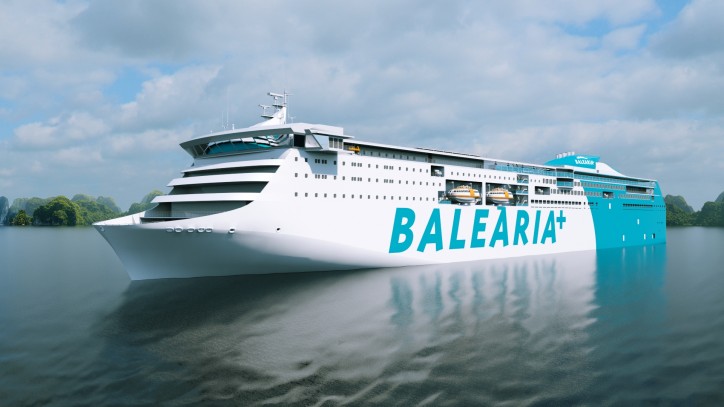Wärtsilä has signed a contract with Construcciones Navales del Norte SL (LaNaval) shipyard in Sestao, Spain for the design and supply of the LNG power and propulsion installation for a new RoRo passenger ferry. There is also an option for a second vessel. The ship is being built for Spanish owner Baleària, a leading operator serving the Balearic Islands. Wärtsilä will also provide inclusive project support services to the yard, including integration engineering and on-site consulting, as well as commissioning of the combined systems. The contract with Wärtsilä was signed in August.

When entering regular service in 2019, this eco-efficient ‘smartship’ will be the first gas-propelled RoRo passenger ferry operating in the Mediterranean Sea, and among the largest ferries in Europe. It has a length of 232 metres and a capacity for 331 vehicles and 1700 passengers, 70% of whom can be accommodated in cabins. Because of the ship’s extensive accommodation facilities and the need to prioritise passenger comfort, stringent standards to reduce noise and vibration will be applied to Wärtsilä’s main and auxiliary engines, propellers, and manoeuvring thrusters.
By sailing on natural gas, the environmental footprint of the vessel will be greatly reduced. In comparison to standard marine diesel fuel, Wärtsilä’s LNG solution reduces CO2 emissions by 25%, nitrogen oxide (NOx) emissions by 85%, while sulphur and particulate matter are virtually entirely eliminated.
The full Wärtsilä scope of supply for this contract includes four 8-cylinder Wärtsilä 50DF dual-fuel main engines, four 9-cylinder Wärtsilä 20DF dual-fuel auxiliary engines, the Wärtsilä LNGPac fuel storage and management system, two twin/single out gearboxes, two Wärtsilä Controllable Pitch Propellers (CPP) with the Wärtsilä ProTouch bridge control system, two Wärtsilä transverse thrusters, plus comprehensive engineering, project management, and on-site yard support services. The Wärtsilä equipment is scheduled to be delivered to the yard in mid-2017.
“Baleària, the owners of this new ferry, appreciate the importance of LNG fuel in providing a cleaner marine environment. Wärtsilä, with a track record of more than 1500 gas fuelled engines with 16 million running hours, has by far the most experience in dual fuel power and propulsion installations. Furthermore, our capability to assume responsibility for the combined ship systems, plus our strong service support and training facilities were other important considerations,” says Aaron Bresnahan, Vice President, Sales, Wärtsilä Marine Solutions.
“In our current order book at LaNaval, we have two vessels that will be powered by dual-fuel engines: a multi-purpose cable laying vessel and this Ro-Pax vessel for Baleària. For both ships, LaNaval has selected Wärtsilä as the supplier of the DF engines, and we have also chosen the company’s LNGPac fuel system. We made this decision based on Wärtsilä’s experience in dual-fuel technology,” says Javier Angulo, Deputy Managing Director and Sales Director at LaNaval.
“The output power from the Wärtsilä engines will allow the ship to reach a speed of 24 knots. Their technology will enable us to be highly efficient and competitive with our passenger and goods services,” says Guillermo Alomar, Baleària’s Fleet Director.
Source: Wartsila